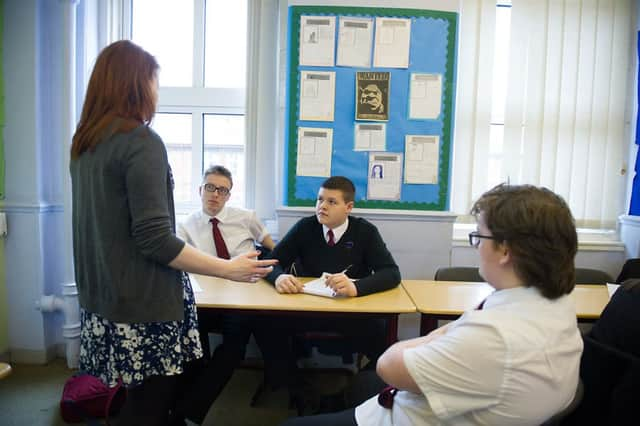Schools face disruption as teachers back strike


Spiralling concerns over teacher workloads saw delegates at the EIS union’s annual meeting yesterday back motions calling for a ballot on industrial action, including strikes over pay and a boycott of work associated with the new Nationals exam.
Council leaders last night insisted they had already offered the “best possible” deal on pay and urged the profession to think again.
Advertisement
Hide AdAdvertisement
Hide AdDavid Baxter, of the Dundee local association of the EIS, which was behind the strike move, said: “Teachers are being worked harder, paid less and are being seriously undervalued. Teachers have had enough. This is the time to act.”
Talks will be held with councils about pay and national exams body the Scottish Qualifications Authority (SQA) over the extra workload teachers are facing, in the hope that strike action can be averted. If no deal is reached, the EIS executive committee will then start making arrangements for ballots on industrial action.
It comes at a time of deteriorating relations between the Scottish Government and the profession after education secretary Angela Constance recently attacked teachers for failing poorer youngsters on basic numeracy and literacy, prompting an angry backlash yesterday.
On the second day of the EIS AGM in Perth, members backed the Dundee motion calling for a campaign for a pay increase which is not linked to working conditions, and called for a ballot on potential strike action if no “satisfactory” deal is struck.
Mike Callaghan, a member of the union’s council, said: “We did not enter the teaching profession to strike but the constant erosion of the education profession must not be allowed to continue.
“I do not want to strike, but if we do not take action now after five years of erosion with no end in sight, when will we?”
Earlier this year, the union put forward proposals for a 5per cent increase for 2015-16, but councils offered a 2.5 per cent rise over two years. This was rejected.
Growing teacher workloads as a result of the new National Qualifications exam system, brought in to replace Standard Grades, are a major source of anger.
Advertisement
Hide AdAdvertisement
Hide AdSusan O’Brien, of South Lanarkshire, said: “We’re now into the third year of delivering the National Qualifications assessments and we know the workload isn’t getting any easier.
“The amount of internal assessment is breaking teachers’ backs, and it is soul-destroying for the pupils.”
A recent survey by the EIS claimed the average teacher worked 46.5 hours a week – 11.5 hours over their contracted 35 hours.
Secondary teachers will now be balloted on a “boycott of co-operation of the SQA” until the workload, including “unit assessment marking”, is reduced.
Graham Boyd, of East Ayrshire, told delegates: “The SQA has become a bureaucratic monster that needs to be slain.”
Alison MacDonald, of the Highland local association, which jointly called for the boycott, also voiced frustrations.
“There is a massive workload imposition by the SQA – an organisation that isn’t even our employer,” she said.
EIS general-secretary Larry Flanagan warned teacher workloads were “unsustainable” as he demanded “real progress”.
Advertisement
Hide AdAdvertisement
Hide AdMr Flanagan said: “The professional commitment of teachers is being abused and taken for granted and we need to give our members the collective strength to say No to excessive workload.”
The issue will be one of the union’s key demands in the run-up to next May’s Holyrood elections.
He also called for more resources for schools, urging the Scottish Government: “Give us back the 4,000 teachers we have lost; give us the smaller class sizes we were promised.”
Ms Constance said the government was working with teachers to address “concerns around workload”. She added: “Industrial action would not be in the interests of anyone, least of all pupils and parents.
“We want to see a fair, affordable deal and are working with councils and the unions to achieve that.”
But the prospect of an increased pay offer appeared unlikely after council leaders last night insisted that they had already made their “very best offer” and there was no more money in the pot.
Drew Hendry, of the Cosla Employers body, which is part of national collective pay bargaining, urged teaching chiefs to understand the “reality” of hard-pressed council finances.
“We have put our very best offer to the teachers’ unions,” Mr Hendry said.
Labour’s education spokesman Iain Gray said: “The SNP government needs to get round the table with teachers and their unions to find a settlement that works for both sides.”